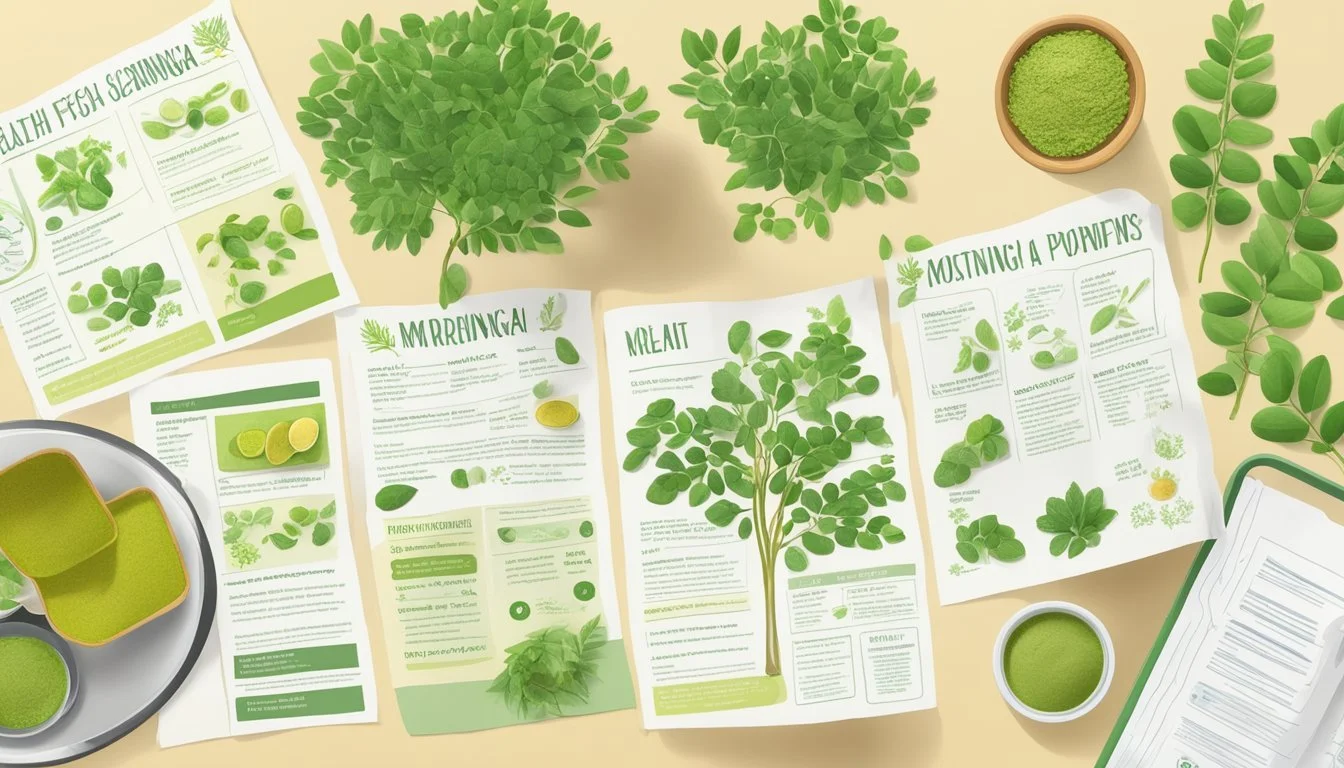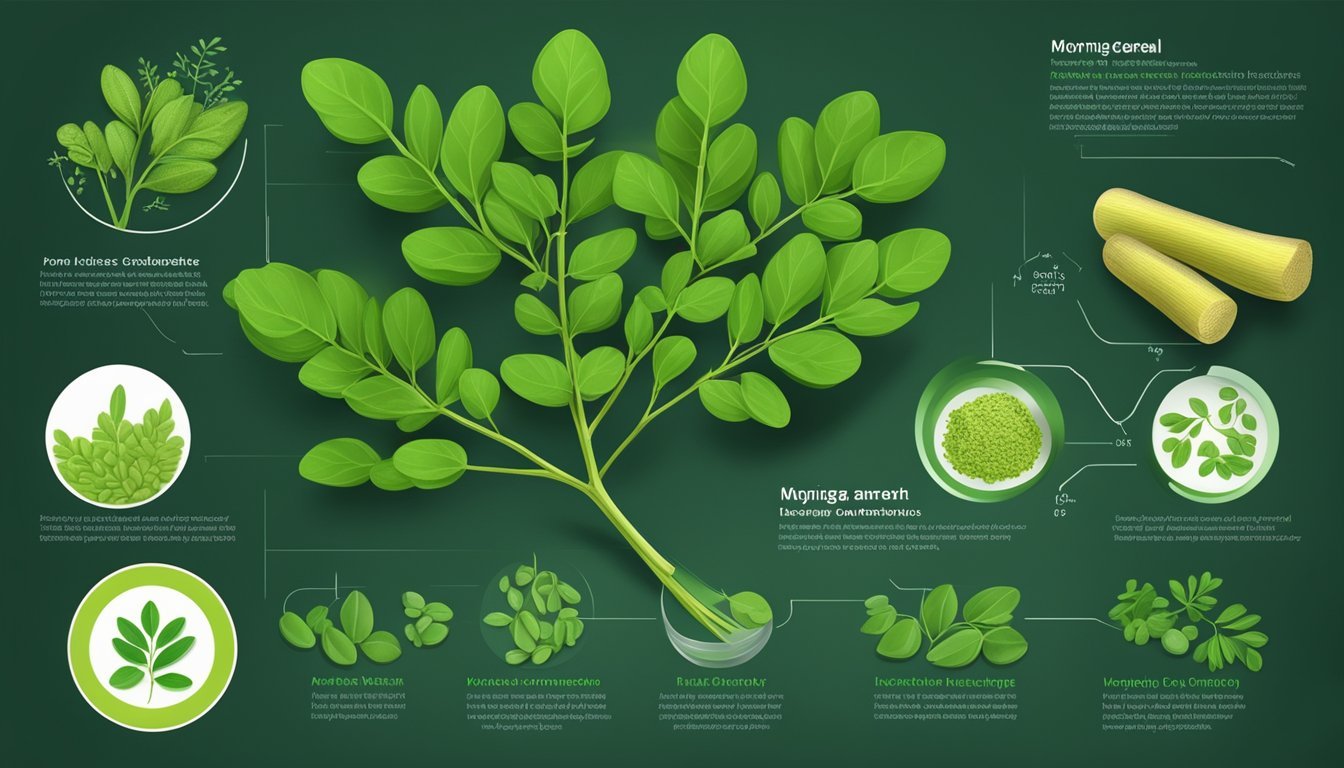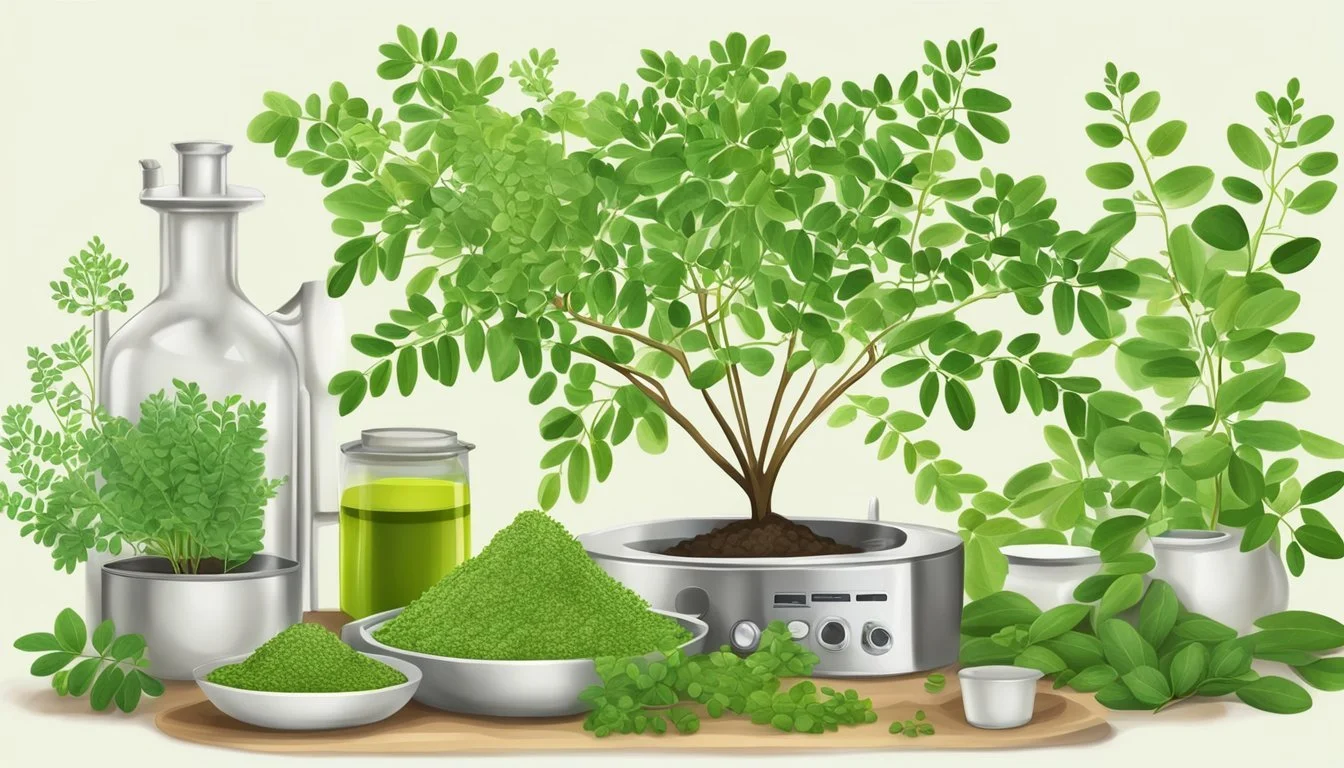The Truth about the Health Benefits of Moringa Powder
Evidence vs. Claims
Moringa, derived from the Moringa oleifera tree, has been touted for its health benefits for centuries. Known as the 'drumstick tree' or 'miracle tree', moringa grows in several tropical and subtropical regions. The tree's leaves, when ground into powder, are said to contain a variety of vitamins, minerals, and amino acids. Among the purported benefits, moringa powder is believed to improve nutritional profiles, support weight management, and help control blood sugar levels.
However, the breadth of moringa's health claims brings into question the legitimacy and extent of its benefits, insisting on a distinction between anecdotal evidence and scientifically validated facts. Current research revolves around its anti-inflammatory, antiviral, and antioxidant properties. A safe consumption level is considered to be the equivalent of 70 grams of moringa leaves daily, which suggests its high threshold for safety. Yet, the inquiry into whether these benefits are as powerful and universal as some proponents claim is ongoing. It is critical for consumers to approach moringa with a discerning eye, examining which health claims are supported by concrete scientific evidence.
Nutritional Profile of Moringa
Moringa, derived from the Moringa oleifera tree, is noted for its rich nutrient density that contributes to its health-promoting properties. The distinct composition includes a spectrum of vitamins and minerals, essential amino acids, and a suite of antioxidant compounds.
Vitamins and Minerals in Moringa
Moringa leaves are a noteworthy source of several essential vitamins and minerals, contributing to its reputation as a superfood. Notably, they are rich in:
Vitamin C: A single serving of moringa can contain as much as 7 times the amount of vitamin C found in oranges, making it a potent antioxidant.
Calcium: Moringa leaves have 4 times more calcium than milk, aiding in bone health and muscular function.
Iron: With high iron content, moringa can have twice the amount found in spinach, assisting in combating anemia and boosting the immune system.
Potassium: It surpasses bananas in potassium, which is vital for nerve function and maintaining a healthy balance of fluids in the body.
Moringa's Amino Acids and Proteins
Moringa is an excellent source of plant-based protein, containing all nine essential amino acids required for human health. Its protein content is comparable to that found in eggs and milk, making it especially beneficial for vegetarians and vegans. The amino acid profile includes:
Histidine
Isoleucine
Leucine
Lysine
Methionine
Phenylalanine
Threonine
Tryptophan
Valine
Antioxidant Compounds in Moringa
The leaves of the Moringa oleifera tree encompass a range of antioxidant compounds:
Flavonoids: Moringa contains quercetin and chlorogenic acid; these antioxidants may lower blood pressure and modulate blood glucose levels, respectively.
Beta-carotene: Present in moringa, this antioxidant is converted into vitamin A and is essential for maintaining healthy vision and immune function.
These components collectively fortify Moringa's profile as a beneficial supplement for maintaining overall health, thanks to its comprehensive range of nutrients.
Health Benefits of Moringa Powder
Moringa powder, derived from the leaves of the moringa tree, has been associated with a variety of health benefits. This section explores its potential effects on blood sugar regulation, cardiovascular health, inflammatory conditions, and cancer prevention.
Moringa's Impact on Blood Sugar and Diabetes
Studies suggest that moringa powder may help in regulating blood sugar levels, making it a beneficial addition to a diabetic's diet. Compounds in moringa powder, such as isothiocyanates, have been shown to enhance insulin sensitivity, potentially helping to manage diabetes more effectively.
Effects on Blood Pressure and Heart Health
Moringa powder contains heart-healthy nutrients like quercetin, which may aid in lowering high blood pressure. Regular consumption of moringa can provide antihypertensive benefits and may also help in reducing cholesterol levels, promoting overall heart health.
Anti-Inflammatory and Pain Relieving Properties
The anti-inflammatory properties of moringa powder are attributed to the presence of isothiocyanates and other potent anti-inflammatory compounds. These substances may contribute to reducing inflammation and may also offer pain relief in various inflammatory conditions.
Moringa's Role in Cancer Prevention
While more research is needed, some laboratory studies have highlighted moringa's potential in cancer prevention. The antioxidant and bioactive compounds found in moringa powder have been observed to inhibit the growth of cancer cells, suggesting a possible protective role against certain types of cancer.
Moringa Powder for Special Health Conditions
Moringa powder has been attributed with potential benefits for specific health conditions, including its use in managing arthritis-related pain, supporting liver health, and bolstering the immune system to combat infections.
Moringa's Use in Managing Arthritis and Pain
Arthritis, a condition characterized by joint inflammation and pain, may be managed with the help of moringa powder. The plant's leaves contain anti-inflammatory properties which can potentially alleviate pain and stiffness. Some studies suggest that moringa's richness in antioxidants contributes to reducing inflammation associated with arthritis, though these claims require more clinical evidence for conclusive validation.
Effects on Liver Health and Detoxification
The liver is instrumental in detoxification and processing of nutrients. Moringa powder is believed to benefit the liver by possibly reinforcing its detoxification capability due to its high levels of polyphenols. These polyphenols might aid in protecting the liver against damage and liver disease. Research is ongoing, but some studies suggest that moringa can assist in restoring liver enzymes to normal levels, indicating a promotion of liver health.
Moringa for Immune Support and Infections
Moringa powder is often promoted for its immune-boosting properties. It contains various nutrients vital for immune function, including vitamins and minerals that could be beneficial in addressing problems like anemia. Moreover, moringa has demonstrated antibacterial effects in lab studies, potentially offering defense against pathogens that cause infections. It's important to note that while moringa may show these properties in controlled settings, the effectiveness of moringa powder in treating bacterial infections in humans requires more thorough research.
Moringa in Traditional and Modern Medicine
Moringa has long been revered in traditional medicine for its health benefits and is now subject to scientific scrutiny to validate these claims.
Historical Uses of Moringa in Medicine
Traditionally, the moringa tree, particularly its leaves, has been utilized for medicinal purposes in various countries including India, Africa, and Asia. In India, it is an important part of Ayurvedic medicine and is believed to treat over 300 ailments. The leaves of the moringa tree are rich in vitamins and minerals and have been used for their antibacterial, antifungal, antiviral, and anti-inflammatory properties. They have been employed to treat conditions such as:
Malnutrition: Due to high nutrient content, particularly calcium and iron, moringa leaves have been used to combat malnutrition.
Digestive Disorders: Moringa has been used to soothe the digestive system and treat ailments like diarrhea.
Skin Conditions: The oil from moringa seeds is applied topically for skin infections and as a moisturizer.
Scientific Research Supporting Moringa's Efficacy
The acclaim of moringa in traditional medicine has sparked scientific research into its potential health benefits. Scientific research often involves both in vitro (test tube) studies and in vivo (animal or human) studies to assess efficacy and safety. Some of the key areas of research include:
Antioxidant Properties: Moringa leaves are high in antioxidants, which are compounds that can prevent damage to cells.
Study Type Findings Animal Studies Indicate potential for managing blood glucose levels and reducing inflammation. Human Trials Suggest beneficial impact on lipid profiles and managing blood sugar.
Anti-inflammatory Effects: Cell and animal studies have shown moringa leaf extract may reduce inflammation, a key factor in chronic diseases.
Nutritional Research: Scientific analyses confirm that moringa leaves contain significant amounts of vitamins A, C, and E, as well as calcium, potassium, and protein.
It should be noted, however, that while results from laboratory and animal studies have been promising, more extensive human clinical trials are needed to conclusively determine the efficacy and safety profile of moringa supplements in a medical setting. Modern research aims to bridge the gap between traditional applications and evidence-based medicine.
Usage and Consumption of Moringa
Moringa oleifera, a plant native to parts of Africa and Asia, is renowned for its nutritional content and has been utilized in various forms for both health benefits and culinary purposes.
Moringa Leaves, Tea, and Powder
Moringa leaves are often consumed in a dried and powdered form. They can be sprinkled over meals or blended into smoothies. Moringa tea is another popular choice and is made by steeping the dried leaves in hot water. The tea can deliver a substantial amount of the plant's nutrients, although in lesser concentrations compared to direct leaf consumption.
Forms of consumption:
Fresh leaves
Dried leaves
Tea infusions
Ground into powder
The use of moringa powder is widespread due to its versatility. The powder retains most of the plant's nutritional properties, making it a convenient supplement to diets.
Extracts and Supplements
Moringa extracts and supplements come in various forms, including capsules and oils. These products concentrate the plant's beneficial compounds, offering a convenient method of consumption, especially for those who might find the taste of moringa powder too strong.
Extracts and supplement forms:
Capsules
Oils
Tinctures
It is essential to purchase supplements and extracts from reputable sources to ensure purity and potency.
Recommended Dosage and Preparations
The recommended dosage for moringa powder ranges from half to one teaspoon daily, which can be adjusted according to individual nutritional needs. To prepare moringa tea, infuse one teaspoon of dried leaves in hot water for about five minutes. When consuming moringa supplements, follow the manufacturer's instructions or consult with a healthcare provider to determine the appropriate amount.
Dosage guidelines:
Moringa powder: 1/2 - 1 teaspoon per day
Moringa tea: 1 teaspoon per cup, infused for 5 minutes
Moringa supplements: As per manufacturer's instructions
As with any food or supplement, moderation is key, and it is advisable to consult with a healthcare provider before starting any new supplement regimen, especially for those with preexisting health conditions.
Safety and Side Effects of Moringa
While moringa is often celebrated for its health benefits, understanding its safety profile and potential side effects is crucial. Consumers should consider these factors, particularly when dealing with specific health conditions or when other medications are involved.
Potential Risks in Certain Populations
Moringa consumption is generally safe for the majority of people when consumed in food amounts. However, certain populations may face risks. Pregnant women should avoid moringa due to possible uterine stimulating properties. Individuals with low blood pressure or those prone to allergic reactions might also experience complications. As with any supplement or dietary change, consulting with a doctor is advisable.
Interaction with Medications and Health Conditions
Consuming moringa can interact with various medications and health conditions. For instance:
Antidiabetic medications: Moringa might enhance their effects, leading to hypoglycemia.
Blood-thinning agents: Moringa has anticoagulant properties that could amplify the effects of these medications.
High blood pressure treatment: It may lower blood pressure, potentially causing it to drop too low when taken alongside antihypertensive drugs.
It’s important for individuals on medication to discuss with healthcare providers the safety of incorporating moringa into their regimen. The FDA does not regulate supplements as strictly as pharmaceuticals, so the onus is on the consumer to ensure their health and safety when taking moringa with other treatments.
Moringa's Sustainability and Environmental Impact
Moringa, often celebrated for its nutritious leaves and seeds, has also gained attention for its sustainable cultivation practices and positive environmental impact, making it a significant player in food security and agricultural development.
Cultivation and Harvesting of Moringa
The moringa tree is known for its hardy nature, thriving in arid conditions where other crops may fail. It requires minimal water, which contributes to its reputation as a drought-resistant species. Cultivation of moringa is straightforward; it can be grown from seeds or cuttings and is adaptable to a variety of soil types, although it prefers sandy or loamy soil. The harvesting process is equally sustainable. The leaves, which are the most used part of the plant, can be harvested several times a year without causing harm to the main structure, ensuring a continual source of nutrition.
Water Usage: Low water requirement compared to other crops.
Soil Adaptability: Grows in varied soil conditions, often improving soil fertility.
Moringa's Role in Food Security and Agriculture
Moringa's resilience to challenging growing conditions makes it a valuable asset for food security, particularly in regions that face frequent droughts or poor soil quality. The tree's ability to grow quickly and produce edible parts within just a few months of planting means that it can provide a rapid source of vitamins and minerals to communities in need. In terms of agriculture, moringa contributes to the sustainability of farming practices by offering shade to more vulnerable crops, helping to replenish depleted soil, and even serving as fodder for livestock.
Nutrient-Rich Food Source: Moringa leaves are dense in essential nutrients.
Soil Replenishment: The tree's roots can help in recovering nutrient-depleted soil.
Agricultural Support: Provides shade and improves biodiversity in farmlands.






